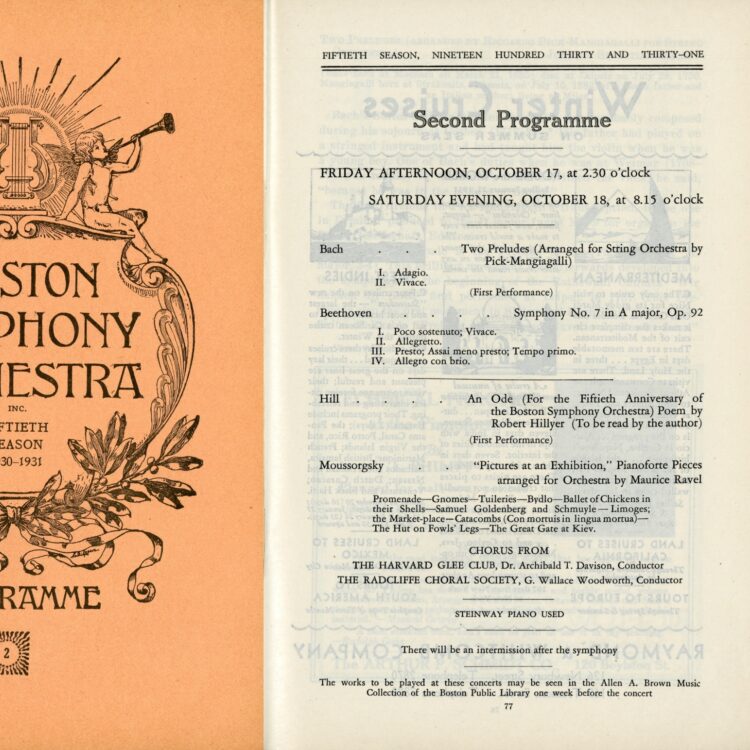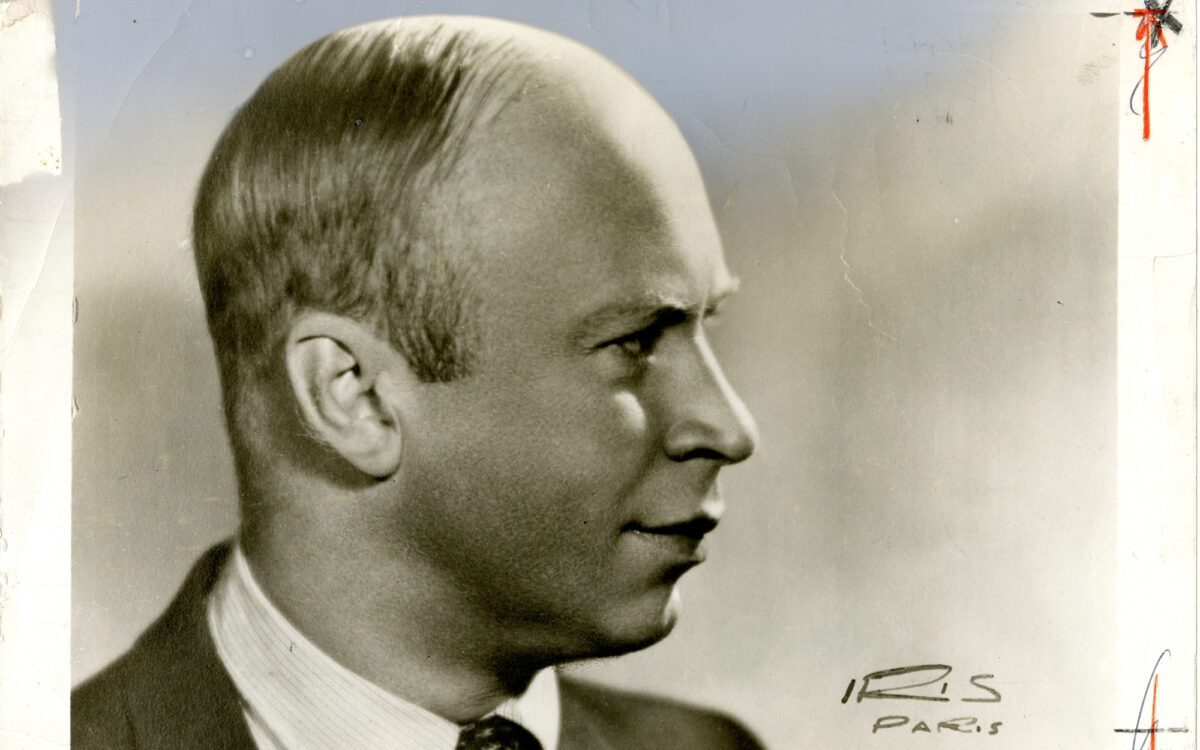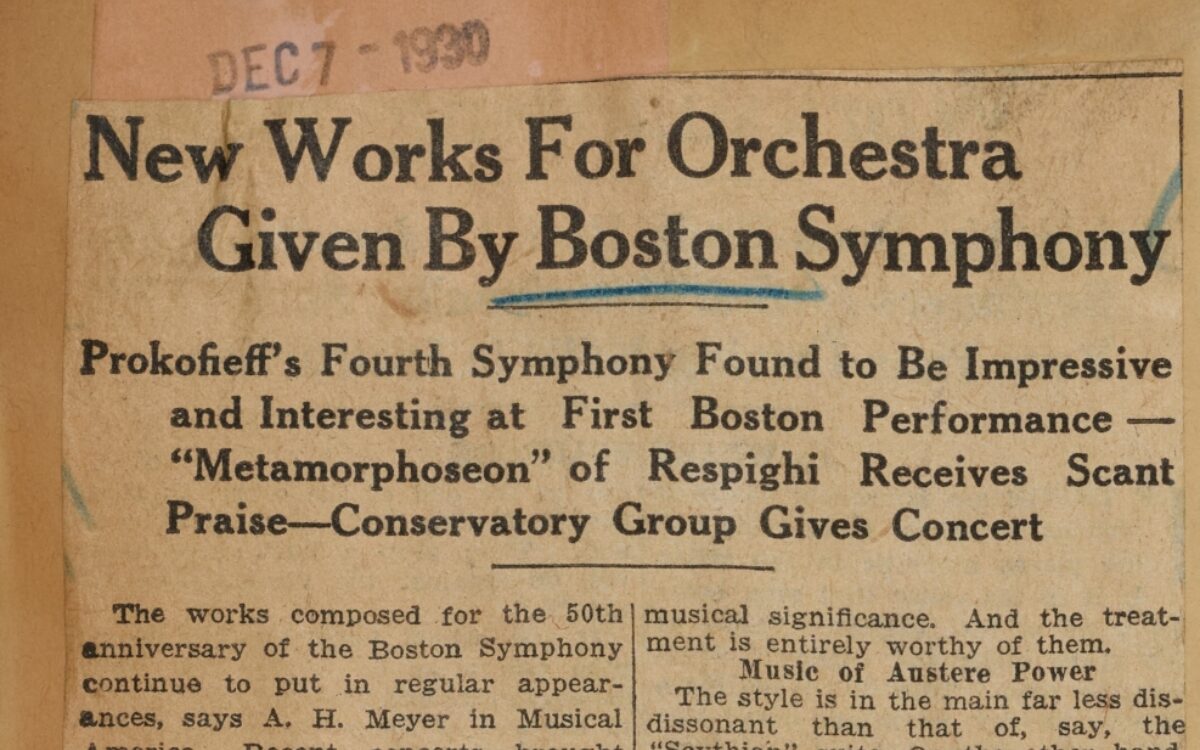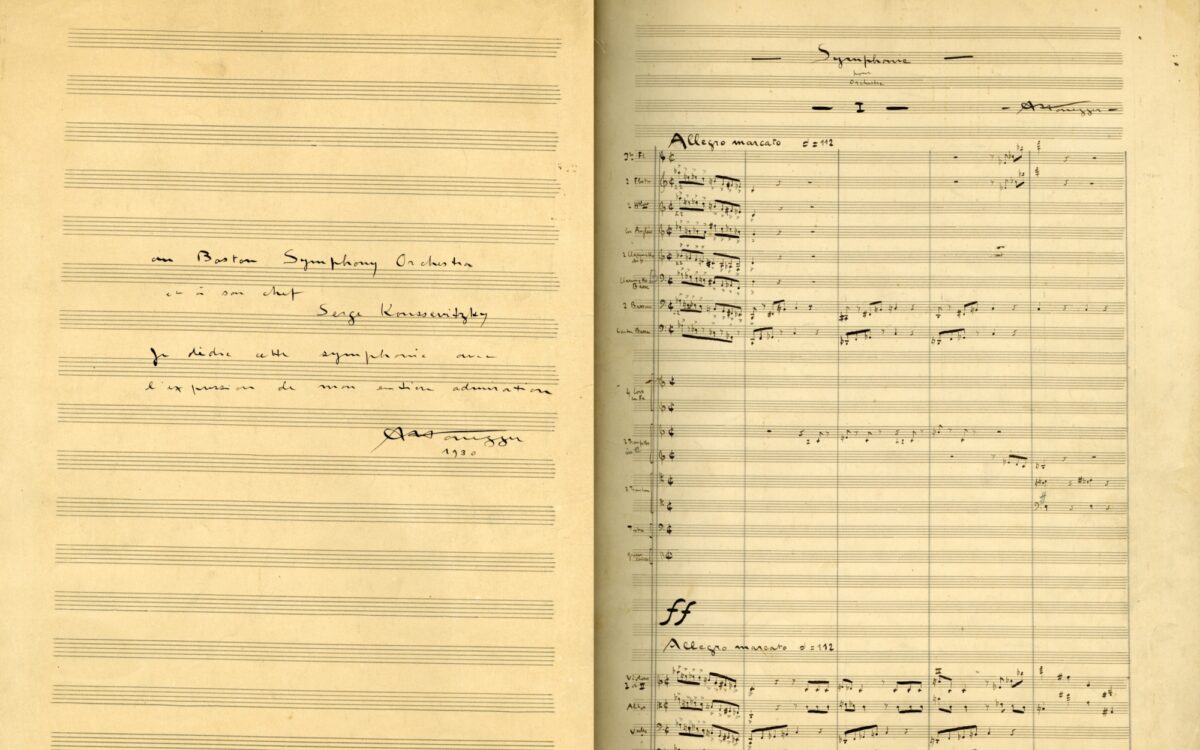Koussevitzky as Founder of the BSO's Commissioning Legacy
Prior to the appointment of Serge Koussevitzky, the Boston Symphony Orchestra had never paid a composer to create new works. While past conductors had maintained close relationships with composers (such as Henschel with Brahms), it was Koussevitzky who established the orchestra’s commissioning legacy, a tradition that continues today. Always a champion of new music, Koussevitzky persuaded the BSO's Board of Trustees to commission several works from prominent composers of the day to celebrate the 50th anniversary of the orchestra in 1931.

Program for the premiere of Edward Burlingame Hill’s Ode for the 50th Anniversary of the B.S.O., Poem by Hillyer
The Ode was commissioned to celebrate the BSO’s 50th anniversary season and was the first of the new commissions to be performed, premiering during the second week of concerts on October 17th, 1930.
BSO 50th Anniversary Season: 1930-1931
Letter from Serge Koussevitzky to Board President Frederick Cabot dated November 6, 1929
Koussevitzky reiterates his vision for a commissioning project that would create five or six works from the “best contemporary composers” to celebrate the BSO’s 50th anniversary. To allay any qualms about the commissioning fee, he provides the reasoning behind his suggestion of that sum.
Review of Boston Symphony Orchestra’s performance of Prokofiev’s Symphony No. 4 on November 14 and 15, 1930, and Respighi’s Metamorphoseon, Modi XII (Theme and Variations) on December 7, 1930
The concerts, featuring two BSO 50th anniversary commissions, received mixed reviews, although the critic felt that Prokofiev was a stronger work, with Saturday’s performance (November 15) producing such a strong audience response that the conductor was called back to the stage several times to acknowledge its applause.
Arthur Honegger's Symphony for Orchestra
Photograph of composer Arthur Honegger (1892-1955)
Swiss composer Arthur Honegger’s work was quite familiar to Serge Koussevitzky. On Koussevitzky’s very first concert as head of the Boston Symphony Orchestra, he conducted the American premiere of Honegger’s Pacific 231 (after having given the world premiere a mere 6 months earlier in Paris).
Photograph by Ruth Orkin
Score for Arthur Honegger’s Symphony for Orchestra, with inscription from the composer opposite the first page
Commissioned for the BSO’s 50th anniversary in the 1930-1931 season, Honegger’s Symphony for Orchestra premiered on February 13, 1931 to mostly positive reviews. The inscribed dedication (translated from French) reads “To the Boston Symphony Orchestra and to its head, Serge Koussevitzky, I dedicate this symphony with the expression of all of my admiration.”
Ottorino Respighi's Metamorphoseon Modi XII
Photograph of Italian composer Ottorino Respighi (1879-1936)
Although he had already expended his initial budget for engaging composers for the BSO’s 50th anniversary celebration, Koussevitzky felt very strongly that Respighi should be included. The conductor petitioned the board of trustees for permission to extend an additional $1000 commission fee to Respighi, and the board voted to support his wishes.
Photographer unknown
Letter from Respighi (in French) to BSO Board President Frederick Cabot on August 20, 1930
This letter written by Respighi informed Frederick Cabot of the completion of the composer’s commission and relayed his regrets at being unable to attend the premiere. A translation from the French is as follows:
“Dear Mr. Cabot,
I have great pleasure in announcing I have finished my composition for the Boston Symphony, and that I have already consigned the score to Ricordi [publisher] who takes care of getting the orchestral material out of it. The title of the composition is Metamorphoseon Modi XII (Tema con Variazioni). I chose this form to give the composition a classic and solemn character, and to be able to highlight the magnificent qualities of each instrument of your orchestra. It’s such a shame that I won’t be able to be in Boston for the first performance of this piece played by the wonderful orchestra that I ‘always thought of’ while writing it! Accept, dear Mr. Cabot, my most cordial greetings, Ottorino Respighi”
Prokofiev's Symphony No. 4 (BSO Commission): Then

Photograph of Russian composer Sergei Prokofiev (1891-1953)
Although their business relationship sometimes suffered from financial disagreements (Koussevitzky’s publishing company Éditions Russes de Musique published many of Prokofiev’s works, but apparently not fast enough for Prokofiev’s liking), the two Russians shared a mostly warm personal friendship during the conductor’s European years, attending each other’s concerts, and experiencing the adventure of a mountain walking tour together.
Photograph by Iris

Draft manuscript of Prokofiev’s Symphony No. 4, written and dated in the composer’s hand
Filled with corrections and scribbled deletions, this working draft manuscript demonstrates Prokofiev’s creative process as he fulfilled his commission for the BSO’s 50th anniversary celebration.







